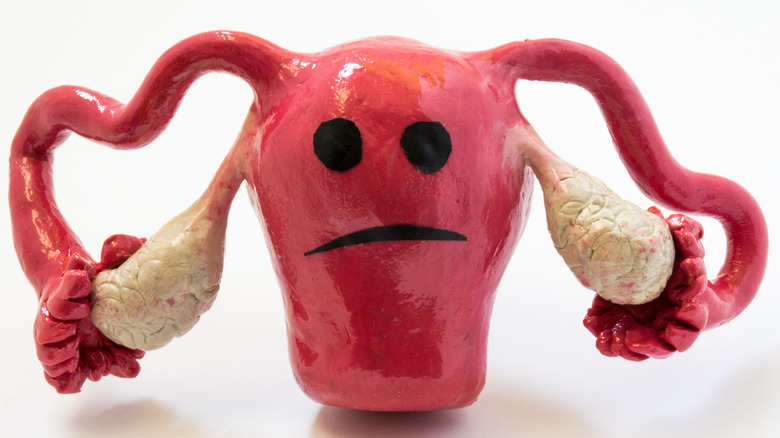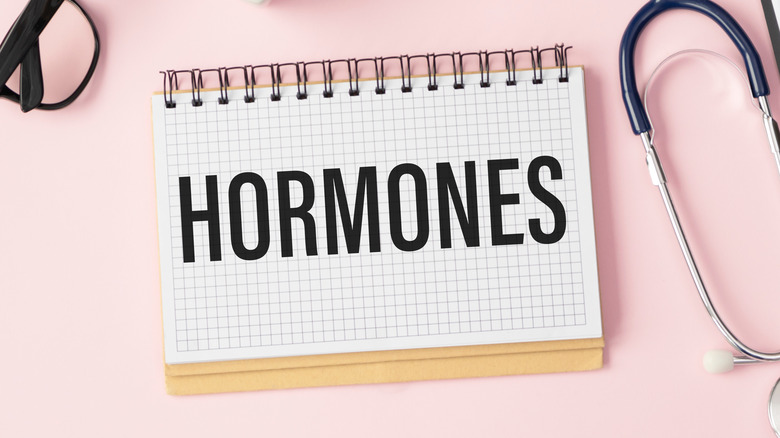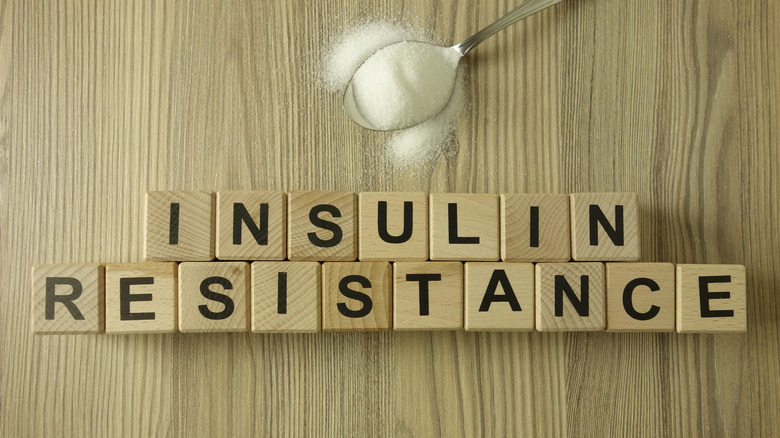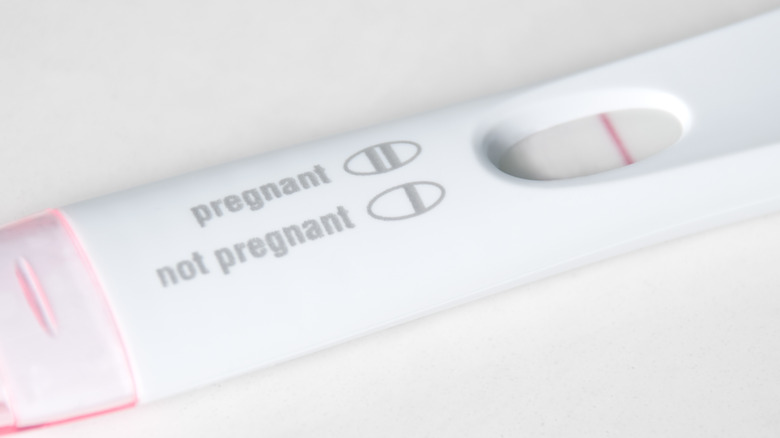PCOS Explained: Causes, Symptoms, And Treatments
Italian scientist Vallisneri is thought to be the first person to describe the symptoms that are now known as polycystic ovary syndrome (PCOS), including infertility and enlarged ovaries (via the National Library of Medicine). However, it wasn't until the 1990s that the condition finally had a name and diagnosis criteria that are still used and refined by the medical world today.
According to the CDC, PCOS currently affects as many as 5 million women of reproductive age in the United States. Although many women may not know they have PCOS for years after first developing symptoms, research shows that the condition could start in childhood or after puberty begins (per Metabolic Syndrome and Related Disorders).
PCOS is still somewhat of a mystery in medicine, as there's no clear-cut cause for most cases. That said, more is being uncovered about the condition. Several factors can play a role in PCOS development, including high levels of "male hormones" (androgens) and insulin (via the Office on Women's Health).
What is PCOS?
PCOS is a condition characterized by a hormone imbalance. More specifically, women with PCOS tend to have high levels of androgens (or male hormones) that may interfere with their reproductive cycle and, therefore, fertility (via the Office on Women's Health). Any woman can develop PCOS. However, it's more common for women of childbearing age to get diagnosed after experiencing problems getting pregnant, having irregular menstrual cycles, or noticing other symptoms that can take longer to develop, like facial hair growth or thinning scalp hair.
Because women can experience a wide range of symptoms with PCOS, diagnosing the condition is still a tricky process. A naturopathic doctoral student at the National University of Natural Medicine, Rachel Peterson, even goes so far as to name it a "medical mystery," noting that PCOS still has a long way to go in terms of awareness and research. The CDC recommends consulting with your doctor if you experience infertility, irregular periods, or excessive hair growth or acne to determine if PCOS could be a likely culprit.
PCOS and hormonal imbalances
PCOS is characterized as a hormonal disorder, which is why women with the condition may experience hormonal changes like facial hair development and missed or irregular menstrual periods (per Mayo Clinic). While there's no one clear cause for PCOS, one of the key factors in the disorder is a higher-than-usual level of androgens. Because androgens are typically more dominant in males, women who have PCOS and elevated androgens may have symptoms that usually occur more commonly in males, like baldness and body hair.
According to Verywell Health, hyperandrogenism or having above-average androgen levels is one of the most tell-tale symptoms for diagnosing PCOS. While all women have some androgens in the body — some of them form into estrogen, a primary female hormone — some women have more than others. A physician may diagnose hyperandrogenism based off physical symptoms like excessive acne or facial hair, or use lab work to test androgen levels.
It could run in your family
If you have been diagnosed with PCOS, it's possible that others in your family have been or will be. Research has shown potential genetic ties to PCOS, with one of the most important discoveries made in 2019. In a study published in The Journal of Clinical Endocrinology & Metabolism, researchers found rare variants in the DENND1A gene that occurred in the traits of families with PCOS. The DENND1A gene influences human ovarian androgen biosynthesis.
Chief endocrinologist and lead study author Dr. Andrea Dunaif explained via HealthDay News that digging into the genetic basis of PCOS is crucial to advancing an understanding of (and treatments) for the condition, rather than just treating its symptoms. Dunaif explained that in the study, the rare DENND1A gene variants were found in about 50% of the families with PCOS, although the variants differed between families. Ultimately, the researchers want to learn how the variants affect the gene's usual function to manipulate it in the future as part of treatment.
PCOS is linked to insulin resistance
According to Clue, many people with PCOS have either high insulin levels or insulin resistance. Insulin resistance causes the pancreas to create more insulin to regulate blood sugars, which could lead to normal glucose levels but high insulin numbers. Insulin resistance occurs in as many as 95% of people with PCOS. Additionally, people with PCOS and obesity are more likely to have insulin resistance.
It's important to note that PCOS symptoms could be caused by insulin resistance. High insulin levels can lead to miscarriage and other infertility issues due to improper nutrition for an embryo and may affect hormone production, leading to excessive androgens in women (via Verywell Health). Endocrinologist Ula Abed-Alwahab explains this phenomenon further in a Cleveland Clinic article, stating: "Insulin is a fat-storage hormone that concentrates fat in your abdominal region. High insulin levels can tell the ovaries to make more testosterone. That's why some women with PCOS have symptoms of excess androgens, like dark hairs on the face and belly."
Obesity is a leading contributor
Research data finds that many women with PCOS are also overweight or obese, according to a 2021 scientific review published in Clinical Endocrinology. With extra weight or obesity comes an increased risk of insulin resistance, which may contribute to several of the symptoms women with PCOS face, like infertility and metabolic dysfunction. The review authors also found that obese women have an odds ratio of 2.77 compared with non-obese women to develop PCOS.
A 2019 review article in Therapeutic Advances in Reproductive Health explores the other side of the spectrum as well. Weight loss can become more difficult for women with PCOS, resulting in a challenging circle of weight gain and worsened symptoms. Having PCOS increases the risk of conditions like type 2 diabetes, non-alcoholic fatty liver disease, obstructive sleep apnea, and impaired glucose intolerance, all of which can be caused by excess weight. However, losing weight with PCOS can become complicated when mental health, hormonal, and metabolism changes associated with PCOS come into play.
Inflammation's influence on PCOS
Inflammation is an important part of our immune system. Inflammation differs from swelling in that it can become chronic and affect large areas of the body. Sometimes, inflammation isn't as helpful to us, even though the body thinks it's doing something good by starting the process.
Inflammation responds to what the body thinks is an ailment or injury. However, PCOS can cause a number of altered bodily processes that may signal to the immune system that inflammation is necessary when it's not (via Verywell Health). People with PCOS usually have higher-than-normal C-reactive protein (CRP) levels, which often indicates an inflammatory response.
A 2020 research article examined inflammatory markers in women with PCOS (via BioMed Research International). One covered study included women with and without PCOS and found that CRP and white blood cells were significantly higher in women with PCOS. Additionally, BMI and insulin resistance seemed to play the biggest part in increased CRP levels.
Verywell Health notes that following an anti-inflammatory diet like the Mediterranean diet could help control inflammation and, therefore, related symptoms and conditions if you have PCOS.
Irregular periods are a tell-tale symptom
Irregular periods are one of the PCOS symptoms that women may notice before anything else, because it can be alarming when they start to get closer together or are missed completely. Women with PCOS can have periods closer together than usual, or may go a month or two without a period even though they aren't pregnant (via the Office on Women's Health). PCOS can also cause some women to stop menstruating altogether.
The American Academy of Family Physicians notes that as many as 14% of women have irregular periods or heavier than usual menstrual bleeding. However, not all of these women may have PCOS. According to Penn Medicine, taking certain medications or having an eating disorder, uncontrolled diabetes, or stress may also cause the issue in some women. While irregular periods are a common symptom of PCOS, only your doctor can determine if your menstruation problems are indeed caused by the condition.
Infertility may mean PCOS
When a woman's menstrual cycle gets thrown off, her ability to reproduce can be affected, too. According to The American College of Obstetricians and Gynecologists (ACOG), the excess androgens that women with PCOS produce can interfere with the menstrual cycle. These male hormones have the power to prevent ovulation by causing the ovaries not to release monthly eggs as usual. ACOG also names PCOS as a leading cause of infertility in women.
However, women who experience infertility issues because of PCOS may still be able to get pregnant. WebMD states that regulating a period with birth control medications sometimes helps women get back on track. For others, ovulation-friendly drugs like clomiphene and metformin can trigger regular ovulation cycles. Potential other treatments include making dietary and physical activity changes for an overall healthier lifestyle and lowering stress.
Most importantly, having a good relationship with your doctor and speaking openly about your PCOS symptoms and concerns is the best course of action to combat infertility.
PCOS can trigger an array of other symptoms
Infertility, excess androgens, and irregular menstruation are the most common symptoms of PCOS and the ones that lead to a medical diagnosis. However, women with PCOS may experience several other symptoms related to the condition, although they can vary significantly in types and severity.
Verywell Health names fat distribution as a potential symptom. Some women find that they store body fat mostly in their belly area, which excess male hormones can cause. Additionally, Mayo Clinic names type 2 diabetes, sleep apnea, depression and other mental health disorders, and severe liver inflammation as potential complications of PCOS.
Perhaps one of the most concerning complications of PCOS is a cardiovascular disease risk. Johns Hopkins cardiology specialist Erin Michos says that many PCOS risk factors are also cardiovascular disease risk factors, like insulin resistance and carrying excess weight. According to Michos, "Studies suggest that women with PCOS have a twice as likely risk of a future cardiovascular event, like a heart attack or stroke."
Diagnosing PCOS
There are currently three diagnostic criteria for a woman to receive a PCOS diagnosis (per the National University of Natural Medicine). These are polycystic ovaries, excess androgen hormones, and delayed ovulation, in no particular order of importance. Still, women with PCOS may experience just two of these symptoms along with a multitude of other symptoms, making diagnosis somewhat complicated. Currently, diagnostic rules state that women with two out of three of the primary symptoms are eligible for a diagnosis, but other conditions should get ruled out first.
Dr. Jessica Chan explains in a Q&A with Cedars-Sinai that blood work can detect the excess androgens that cause acne and excessive body or facial hair. "Your doctor will use an ultrasound to check for cysts," says Chan. She also states that "collections of 12 or more egg follicles or 'cysts' on your ovaries that may be larger than normal" can check the box for a polycystic ovary diagnosis.
Managing PCOS through diet and exercise
One of the first things your doctor may tell you to do after getting a PCOS diagnosis is to focus on your diet and physical activity. Endocrinologist Ula Abed-Alwahab tells Cleveland Clinic that making the right changes to your diet can positively influence the metabolic processes that occur with PCOS. According to Abeb-Alwahab, eating processed foods filled with simple carbs contributes to insulin resistance, so women with PCOS should try to avoid them as much as possible. "There's a large subset of women with PCOS who will thrive on a low-grain or grain-free food plan – similar to a paleo way of eating," Abed-Alwahab says. "Start with a JERF (Just Eat Real Food) diet consisting of whole, unprocessed, unrefined foods."
And exercise is just as important, as it can help you lose excess weight or maintain a healthy weight and lower your risk of cardiovascular disease and type 2 diabetes. For reference, a 2019 review exploring the effects of exercise on PCOS found that exercise lowered fasting insulin levels, triglycerides, total cholesterol, body fat percentage, and waist circumference (per Systematic Reviews). Healthline states that any physical activity is better than none, but a mix of cardio and strength training can help build muscles, burn fat, and keep the heart healthy.
Medicinal treatments for PCOS
While there's no magic medication to treat PCOS, there are a few medicinal treatments your doctor might suggest for your symptoms. Most commonly, your doctor may start you on birth control pills that contain estrogen and progestin, which help the body regulate female hormone production and combat the male hormones that might be currently taking over (via Mayo Clinic). Birth control may also regulate your menstrual cycle. Some women might start medication therapies to spark ovulation. These medications allow the ovaries to release eggs as they should, which may benefit women dealing with infertility.
According to Mayo Clinic, other common medications target acne and hair growth, like eflornithine to slow facial hair growth and spironolactone to inhibit the effects of androgens. Johns Hopkins Medicine also notes that some women begin medications for diabetes to lower insulin resistance, but a few of them are also helpful for ovulation and nixing the side effects of male hormones.
PCOS may require a care team
Your primary care physician will usually be your go-to person for questions, concerns, and advice about your PCOS. However, PCOS may require a team of multiple specialists to help you control your symptoms and feel at your best. Because of the array of symptoms and complications associated with PCOS, women might benefit from seeking a therapist for mental health concerns, a fertility specialist for ovulation help, or an endocrinologist for insulin resistance or diabetes. In some cases, women seek the help of multiple doctors before actually getting their diagnosis because of the complexity of the condition (via Science Daily).
A 2018 review in the Journal of Clinical Medicine advocates for a multidisciplinary approach when treating women with PCOS. "PCOS is a multifaceted and complex syndrome that requires care from multiple providers to fully treat the full spectrum of the condition. It can be difficult to treat due to its heterogeneity between patients, which therefore requires specialized, individualized and focused care," according to the authors. The researchers also say that a team of specialists can better manage specific pieces of a woman's care, including weight management, menstrual irregularity, and potential comorbidities.
If you believe that any of your symptoms could be better managed by a different type of doctor, don't hesitate to ask your primary care doctor for a referral.
Taking care of your mental health with PCOS
Physical symptoms may not be the only ones you have with PCOS. The condition can also take its toll on a woman's mental health. A review published in a 2018 edition of Endocrine covered 57 studies of women and mental health disorders like anxiety and depression. Women diagnosed with PCOS were likelier to also have a diagnosis of depression, anxiety, bipolar disorder, or obsessive-compulsive disorder. Additionally, the women ranked the severity of their symptoms higher than women without PCOS.
In another study led by researchers at the Columbia School of Nursing, menstrual abnormalities, infertility, and hair growth were among the top contributors to mental distress for women with PCOS.
It's crucial to focus on your mental health as well as your physical health if you've been diagnosed with PCOS. Clue suggests making changes to your exercise and diet habits to see what works for you, along with trying mindfulness and relaxation techniques. In some cases, medications and supplements might be worth discussing with your team.
If you or someone you know is struggling with mental health, please contact the Crisis Text Line by texting HOME to 741741, call the National Alliance on Mental Illness helpline at 1-800-950-NAMI (6264), or visit the National Institute of Mental Health website.















